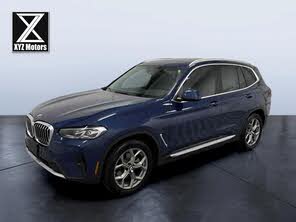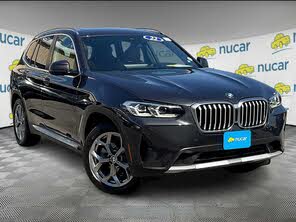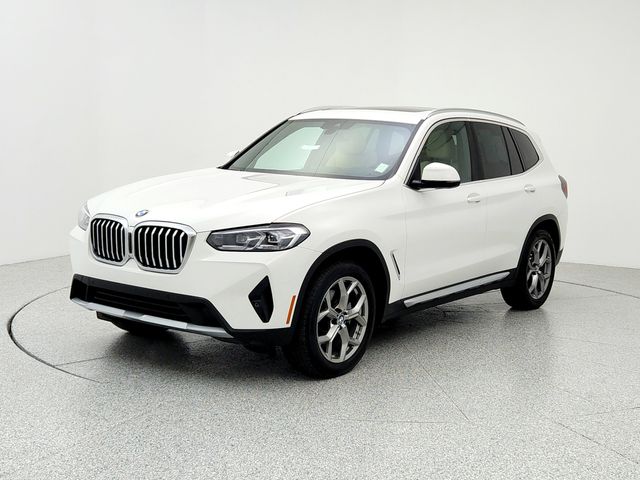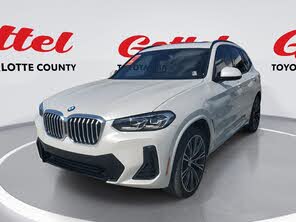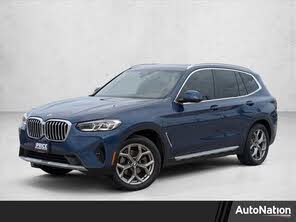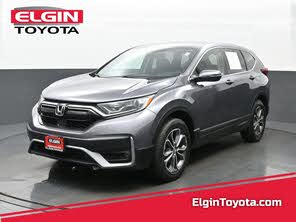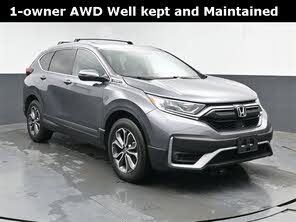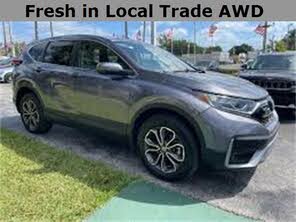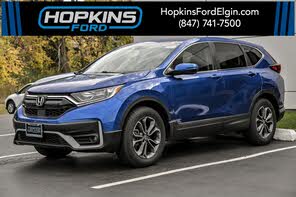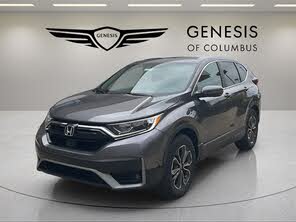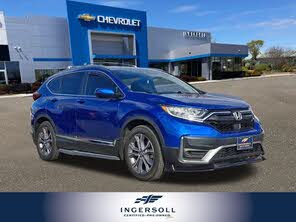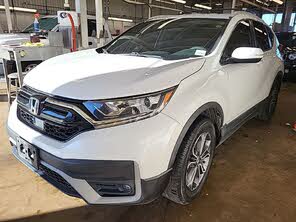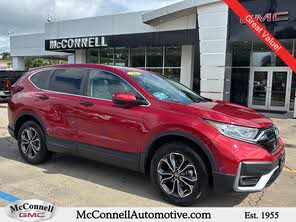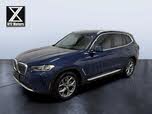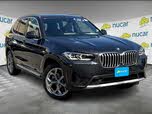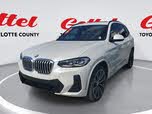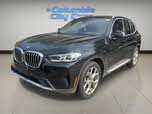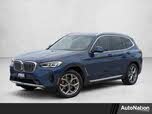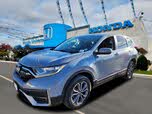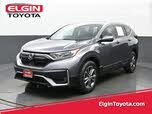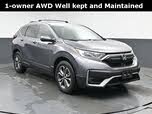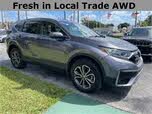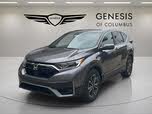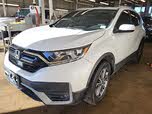2022 BMW X3 vs 2021 Honda CR-V
Overview | |
MSRP$25,350 | MSRP$43,700 |
Listings1279 | Listings1352 |
Ratings & Reviews | |
User Reviews | User Reviews |
Expert reviews7.8 out of 10 | Expert reviews7.8 out of 10 |
Pros
Cons
| Pros
Cons
|
2021 Honda CR-V Reviews SummaryEven in a grim year, Honda is selling a staggering number of CR-Vs. The CR-V is the best-selling Honda by far. It’s also the second best-selling compact SUV, just behind the Toyota RAV4. And it's the fifth best-selling vehicle in the U.S., and if you take out all the commercial sales of full-size pickups it’s one of the two best-selling vehicles year in and year out. So it’s hard to argue against the CR-V formula. Honda’s been at this almost as long as crossovers have been a thing, launching the CR-V in 1997—a year after the RAV4 debuted. The funny thing is, aside from sales volume, there’s only one thing the CR-V particularly excels at. Aesthetics are subjective, but it would be hard to argue the CR-V is the best looking vehicle in its class. It’s not the cheapest. It’s not the best equipped, especially at the middle to lower trim levels. It’s not the fastest, nor is it the quietest, or the most fuel efficient. It’s not even the most reliable, showing up nowhere in J.D. Power's Most Reliable list. So what makes it so appealing to American consumers? Let’s see if we can figure that out. | |
2022 BMW X3 Reviews SummarySince its inception in 2003, the BMW X3 has grown to become one of the brand’s top sellers. And starting with its second generation (circa 2010), the luxury compact crossover has been built at BMW Spartanburg—the automaker’s only United States manufacturing facility. Incidentally, because Spartanburg is the global producer of every gas-powered BMW crossover besides the X1 and X2, the plant also boasts the highest production numbers of any BMW plant worldwide. One can speculate that the popular X3 has a lot to do with that. Last redesigned for 2018, the X3 receives a rather hefty mid-cycle refresh for 2022. Although the xDrive30e plug-in hybrid has been dropped from the lineup, updates to the remaining models include design tweaks, new engines, more technology, and an expanded suite of safety features. | |
No video found | No video found |
Popular Features & Specs | |
Engine1.5L 190 hp I4 | Engine2.0L 248 hp I4 |
Drive TrainFWD | Drive TrainRWD |
Seating Capacity5 | Seating Capacity5 |
Horsepower190 hp @ 5600 rpm | Horsepower248 hp @ 5200 rpm |
MPG City28 | MPG City23 |
MPG Highway34 | MPG Highway29 |
Engine | |
Engine Name1.5L 190 hp I4 | Engine Name2.0L 248 hp I4 |
Torque179 lb-ft @ 2000 rpm | Torque258 lb-ft @ 1450 rpm |
Horsepower190 hp @ 5600 rpm | Horsepower248 hp @ 5200 rpm |
DrivetrainFWD | DrivetrainRWD |
Fuel Economy | |
MPG City28 | MPG City23 |
MPG Highway34 | MPG Highway29 |
Interior | |
Seating Capacity5 | Seating Capacity5 |
Key Features | |
Navigation System | Navigation SystemStandard |
Safety | |
Front Crash Overall5 | Front Crash Overall5 |
Side Crash Overall5 | Side Crash Overall5 |
Dimensions & Capacity | |
Cargo Space39.2 cu ft | Cargo Space28.7 cu ft |
Curb Weight3337 lbs | Curb Weight4079 lbs |
Height66.1 in | Height66.0 in |
Length182.1 in | Length185.9 in |
Width73.0 in | Width84.2 in |
Wheelbase104.8 in | Wheelbase112.8 in |
Maximum Payload1358 lbs | Maximum Payload904 lbs |
Number of doors4 | Number of doors4 |
Maximum Towing Capacity1500 lbs | Maximum Towing Capacity4400 lbs |
Overview | ||
MSRP | $25,350 | $43,700 |
Listings | ||
Ratings & Reviews | ||
User reviews | ||
Expert reviews | 7.8 out of 10Read full review | 7.8 out of 10Read full review |
Pros & cons | Pros
Cons
| Pros
Cons
|
Summary | Even in a grim year, Honda is selling a staggering number of CR-Vs. The CR-V is the best-selling Honda by far. It’s also the second best-selling compact SUV, just behind the Toyota RAV4. And it's the fifth best-selling vehicle in the U.S., and if you take out all the commercial sales of full-size pickups it’s one of the two best-selling vehicles year in and year out. So it’s hard to argue against the CR-V formula. Honda’s been at this almost as long as crossovers have been a thing, launching the CR-V in 1997—a year after the RAV4 debuted. The funny thing is, aside from sales volume, there’s only one thing the CR-V particularly excels at. Aesthetics are subjective, but it would be hard to argue the CR-V is the best looking vehicle in its class. It’s not the cheapest. It’s not the best equipped, especially at the middle to lower trim levels. It’s not the fastest, nor is it the quietest, or the most fuel efficient. It’s not even the most reliable, showing up nowhere in J.D. Power's Most Reliable list. So what makes it so appealing to American consumers? Let’s see if we can figure that out. | Since its inception in 2003, the BMW X3 has grown to become one of the brand’s top sellers. And starting with its second generation (circa 2010), the luxury compact crossover has been built at BMW Spartanburg—the automaker’s only United States manufacturing facility. Incidentally, because Spartanburg is the global producer of every gas-powered BMW crossover besides the X1 and X2, the plant also boasts the highest production numbers of any BMW plant worldwide. One can speculate that the popular X3 has a lot to do with that. Last redesigned for 2018, the X3 receives a rather hefty mid-cycle refresh for 2022. Although the xDrive30e plug-in hybrid has been dropped from the lineup, updates to the remaining models include design tweaks, new engines, more technology, and an expanded suite of safety features. |
Video | No video found | No video found |
Popular Features & Specs | ||
Engine | 1.5L 190 hp I4 | 2.0L 248 hp I4 |
Drive Train | FWD | RWD |
Seating Capacity | 5 | 5 |
Horsepower | 190 hp @ 5600 rpm | 248 hp @ 5200 rpm |
MPG City | 28 | 23 |
MPG Highway | 34 | 29 |
Engine | ||
Engine Name | 1.5L 190 hp I4 | 2.0L 248 hp I4 |
Torque | 179 lb-ft @ 2000 rpm | 258 lb-ft @ 1450 rpm |
Horsepower | 190 hp @ 5600 rpm | 248 hp @ 5200 rpm |
Drivetrain | FWD | RWD |
Fuel Economy | ||
MPG City | 28 | 23 |
MPG Highway | 34 | 29 |
Interior | ||
Seating Capacity | 5 | 5 |
Key Features | ||
Navigation System | Standard | |
Safety | ||
Front Crash Overall | 5 | 5 |
Side Crash Overall | 5 | 5 |
Dimensions & Capacity | ||
Cargo Space | 39.2 cu ft | 28.7 cu ft |
Curb Weight | 3337 lbs | 4079 lbs |
Height | 66.1 in | 66.0 in |
Length | 182.1 in | 185.9 in |
Width | 73.0 in | 84.2 in |
Wheelbase | 104.8 in | 112.8 in |
Maximum Payload | 1358 lbs | 904 lbs |
Number of doors | 4 | 4 |
Maximum Towing Capacity | 1500 lbs | 4400 lbs |
The 2021 Honda CR-V had a design that blended into the crowded compact crossover market. Its styling was nearly identical to its competitors, with only minor details like the grille and some chromed plastic features setting it apart. The CR-V was available in eight colors, but most were shades of gray, black, or white, with vibrant options like Aegean Blue Metallic and Radiant Red Metallic being rare and limited to higher trims. Inside, the CR-V offered black, gray, and ivory cloth or leather, with higher trims featuring wood panels and more chrome for a modern look. However, competitors like the Kia Sportage and Hyundai Tucson offered more distinctive styling.
The 2022 BMW X3 presented a more aggressive exterior design with a larger kidney grille and slimmer adaptive full LED headlights. The rear featured new taillights with a black surround and pincer claw-shaped brake light LEDs. The X3 was available in nine finishes, including new metallic colors like Brooklyn Grey and Tanzanite Blue II. Standard 19-inch gray aluminum-alloy wheels and an optional aerodynamically-optimized 19-inch wheel improved fuel economy. The M Sport Package added sportier design elements, while the Shadowline Package provided a black-out treatment. The X3 M40i featured high-gloss black double-bar grille inserts and M-designed light-alloy wheels.
















The 2021 Honda CR-V was not built for high performance but offered smooth and steady acceleration with its 190-horsepower turbocharged four-cylinder engine. It took about 7.8 seconds to reach 60 mph, which was competitive within its class. The CR-V's continuously variable transmission (CVT) provided a predictable driving experience, though it lacked the engagement of competitors with conventional transmissions. Front-wheel drive was standard, with all-wheel drive as an option. The CR-V's suspension setup ensured decent handling and ride quality, making it a reliable choice for everyday driving.
The 2022 BMW X3 featured an eight-speed automatic transmission with paddle shifters. The X3 sDrive30i and xDrive30i models had a 2.0-liter turbocharged four-cylinder engine producing 248 horsepower and 258 pound-feet of torque, achieving 0-60 mph in 6 seconds. Fuel economy for the sDrive30i was 23 mpg city, 29 mpg highway, and 25 mpg combined, while the xDrive30i offered 21 mpg city, 28 mpg highway, and 24 mpg combined. The X3 M40i, with a 3.0-liter turbocharged six-cylinder engine and mild-hybrid system, produced 382 hp and 369 lb-ft of torque, reaching 0-60 mph in 4.4 seconds. The M40i's adaptive suspension and sport brakes provided a more exhilarating driving experience, though the mild-hybrid system did not improve fuel economy.
The 2021 Honda CR-V was designed to fit five people comfortably and carry their gear. It offered 102.9 cubic feet of passenger volume and 75.8 cubic feet of total cargo volume with the rear seats folded. The tailgate options varied by trim, with the Touring trim featuring a hands-free power tailgate. Roof rails were standard only on the top-of-the-line Touring trim.
The 2022 BMW X3 provided seating for five and ample storage space. The rear seats featured a 40/20/40-split, and the cargo area accommodated multiple backpacks and equipment. A power tailgate was standard, with an optional hands-free opening. The SensaTec faux-leather seats were comfortable, with the upgraded Vernasca leather adding more softness. The redesigned center console and larger infotainment system improved vehicle ergonomics. The X3's sport seats offered good support, though the thigh-support cushion control handle could be an issue for some drivers.
The 2021 Honda CR-V's base LX trim had a 5-inch color screen with Bluetooth connectivity. Other trims featured a 7-inch high-definition touchscreen infotainment system with Apple CarPlay and Android Auto integration. The audio system varied by trim, with the Touring trim offering a 300-watt system with a subwoofer. Charging ports were available throughout the vehicle, with the Touring trim adding a wireless phone charger.
The 2022 BMW X3 came standard with BMW Live Cockpit Plus with iDrive 7 telematics, featuring a 5.1-inch color display instrument panel and 10.25-inch infotainment screen. The system included navigation, Android Auto, Apple CarPlay, Amazon Alexa integration, and a 4G LTE WiFi hotspot. An optional Live Cockpit Professional enlarged both screens to 12.3 inches. The standard 12-speaker 205-watt HiFi sound system could be upgraded to a 16-speaker Harman Kardon surround sound system on M40i models. Additional tech options included a Convenience Package and a Premium Package, offering features like a panoramic sunroof, heated seats, and a head-up display.
The 2021 Honda CR-V excelled in safety, earning a five-star NHTSA overall crash test rating and an IIHS Top Safety Pick award. The CR-V's Honda Sensing system made advanced safety features standard across all trims, including a multi-angle rearview camera, forward collision warning, lane departure warning, automatic emergency braking, road departure mitigation, lane keeping assist, adaptive cruise control, and auto high-beam headlamps. The EX trim and above also included a blind spot monitoring system with rear cross-traffic alert.
The 2022 BMW X3 received a five-star crash safety rating from the NHTSA. While IIHS crash test results were not yet available, the 2018 X3 was named a Top Safety Pick+. The 2022 X3 added more safety features, including adaptive LED headlights, a rearview camera, adaptive cruise control, lane departure warning, active blind-spot monitoring, rear cross-traffic alert, rear collision avoidance, park distance control with auto braking, and forward-collision warning with pedestrian/cyclist detection. Optional packages added features like parking assistance, 360-degree surround camera view, traffic jam assistance, and active lane-keep assist with lane centering.
CarGurus highlights
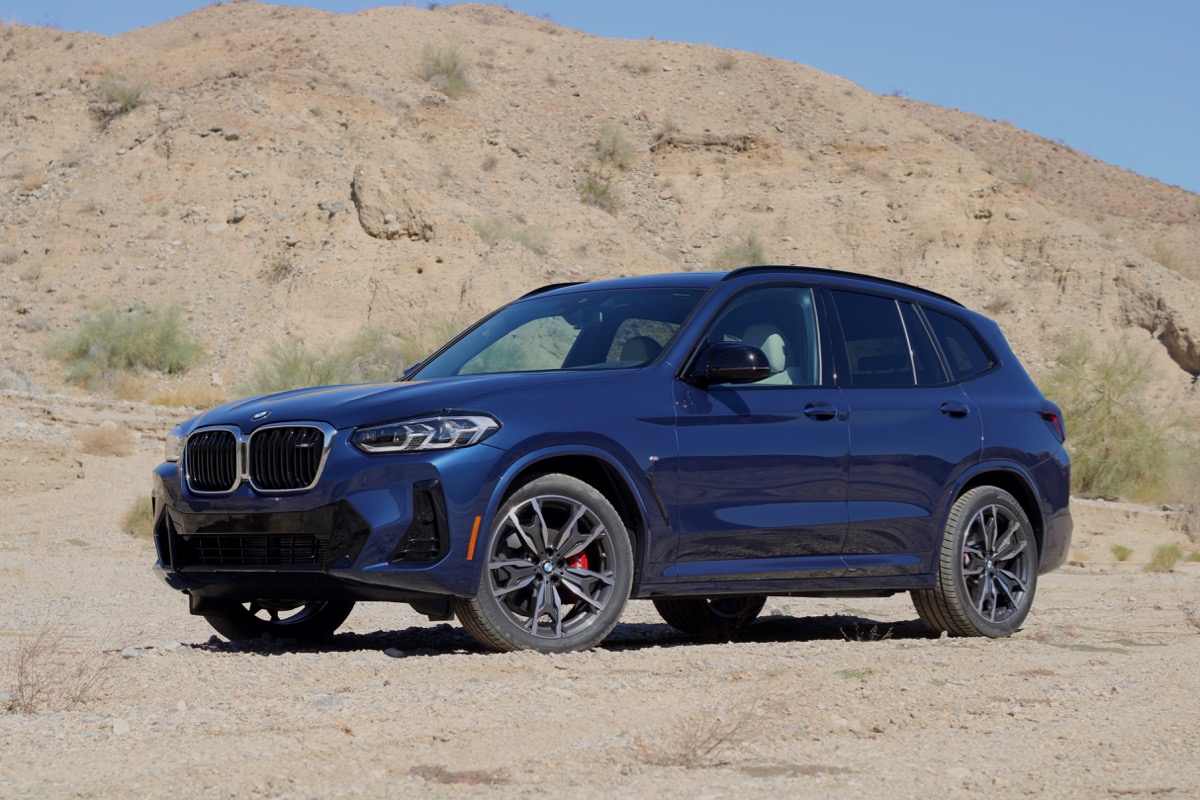
According to CarGurus experts, the overall rating for the 2021 Honda CR-V is 7.8 out of 10, while the 2022 BMW X3 scores 7.8 out of 10. Both vehicles offer strong attributes, but the final recommendation depends on your priorities. If you value safety, practicality, and reliability, the 2021 Honda CR-V is an excellent choice. However, if you seek luxury, advanced technology, and a more dynamic driving experience, the 2022 BMW X3 is the better option.
Choose the 2022 BMW X3 if:
- You want a luxury compact crossover with a more aggressive and stylish design.
- You seek a vehicle with advanced technology and customizable infotainment options.
- You desire a more exhilarating driving experience with higher performance options.
Choose the 2021 Honda CR-V if:
- You prioritize safety features that come standard across all trims.
- You need a spacious and practical vehicle for carrying passengers and cargo.
- You prefer a reliable and predictable driving experience.
CarGurus highlights

According to CarGurus experts, the overall rating for the 2021 Honda CR-V is 7.8 out of 10, while the 2022 BMW X3 scores 7.8 out of 10. Both vehicles offer strong attributes, but the final recommendation depends on your priorities. If you value safety, practicality, and reliability, the 2021 Honda CR-V is an excellent choice. However, if you seek luxury, advanced technology, and a more dynamic driving experience, the 2022 BMW X3 is the better option.
Choose the 2022 BMW X3 if:
Shop Now- You want a luxury compact crossover with a more aggressive and stylish design.
- You seek a vehicle with advanced technology and customizable infotainment options.
- You desire a more exhilarating driving experience with higher performance options.
Choose the 2021 Honda CR-V if:
Shop Now- You prioritize safety features that come standard across all trims.
- You need a spacious and practical vehicle for carrying passengers and cargo.
- You prefer a reliable and predictable driving experience.

By: CarGurus + AI
At CarGurus, our team of experienced automotive writers remain at the heart of our content operation, conducting hands-on car tests and writing insightful guides that are backed by years of industry experience. To complement this, we are harnessing AI to make our content offering more diverse and more helpful to shoppers than ever. To achieve this, our AI systems are based exclusively on CarGurus content, ratings and data, so that what we produce is both unique to CarGurus, and uniquely helpful to car shoppers.


